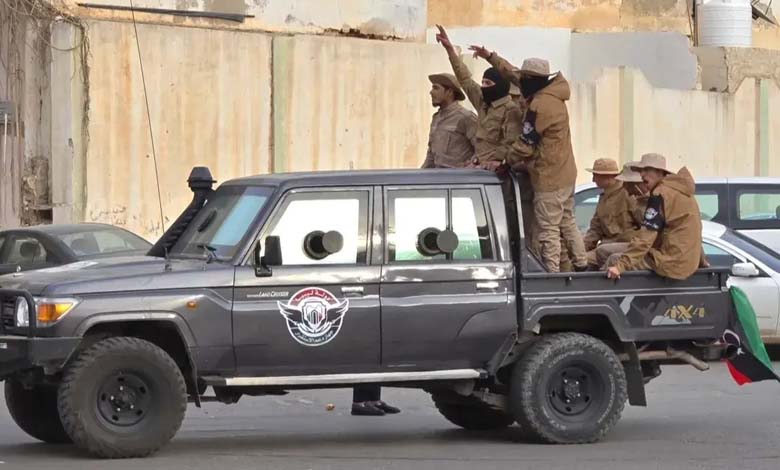Complications Hindering the Evacuation of Militias from Tripoli
A US research center enumerates the reasons that make it difficult for the Government of National Unity to implement an agreement to remove armed groups from the capital, Tripoli.

The American research center ruled out the departure of armed militias from the Libyan capital, Tripoli, after Ramadan, basing its estimates on complications and logical reasons that make the disappearance of these militias difficult, primarily because they are largely associated with the outgoing Government of National Unity.
Despite their involvement in supporting the security and military apparatus of the authority governing western Libya, these armed groups are like ticking time bombs, capable of exploding at any moment. They have previously caused bloody security incidents in Tripoli and its surroundings, serving as evidence of the danger of weapons proliferation, even for trivial reasons.
There is a struggle for influence and interests among some heavily armed militias, resulting in armed clashes on multiple occasions with heavy weapons, often leading to dozens of deaths and injuries.
The American Strategic and Security Research Center, Stratfor, stated that there are four reasons why the likelihood of these armed groups leaving the capital Tripoli after Ramadan is slim, a commentary on statements from the Ministry of Interior affiliated with the Government of National Unity.
Imad al-Tarabulsi, the Interior Minister in the government of Abdul Hamid Dbeibah, announced plans to evacuate the capital Tripoli of all armed formations after Ramadan, while the authorities in western Libya have not presented a clear plan on how to evacuate the capital from armed militias.
The report issued by Stratfor considered the implementation of what the Libyan Interior Minister stated as difficult because these militias are connected or “integrated into the state apparatus, and many members of the internationally recognized government have relationships with these armed groups.”
It also observed that most of these militias are present in the capital and have entrenched themselves in parts of the city, making it difficult to remove them or even to elicit their cooperation to return to their headquarters.
The American center also noted that completely replacing these militias with a police force in the Libyan capital seems challenging due to the limited number of security personnel and government resources.
-
Ongoing crises – The Libyan scene is heading towards further complexity between Dbeibeh and Bashagha
The armed groups loyal to the unity government bear security and supervisory responsibilities, but disputes between them or power struggles often lead to bloody armed confrontations, embarrassing the authority in western Libya.
Stratfor’s report indicated the possibility of an agreement to remove these militias from parts of the capital to demonstrate the ability of the government led by Abdul Hamid Dbeibah to control the situation. However, this control seems limited amid the proliferation of weapons, as seen in the recent clashes on February 18.
Last Wednesday, the Interior Minister of the unity government announced reaching an agreement to evacuate armed groups from the capital Tripoli and their return to their headquarters and barracks. Still, the mechanisms for implementing this step and whether agreements have been reached with all groups or only some remain unclear.
Imad al-Tarabulsi stated in a press conference that negotiations and consultations lasting more than a month led to an agreement with the security agencies to completely evacuate the capital from armed individuals in the near future.
He added, “There will only be police, rescue, and criminal investigation elements,” referring to the official security agencies under the Ministry of Interior, including “public security, stability support, deterrence, and the 111 and 444 combat brigades.”
Even these regular security formations are not disciplined formations, as previous clashes between some of their components have occurred, posing many challenges in dealing with them as agencies subject to the authority of the Ministry of Interior.
In August 2023, clashes between the Special Deterrence Force and the 444 Brigade resulted in the deaths of 55 people and the injury of 146 others.
The competition between various armed formations has led to devastating confrontations and casualties among their members, increasing the level of violence in the Libyan capital and its surroundings.
The armed militias formed after the 2011 revolution have independently carried out assassinations of the Libyan leader Muammar Gaddafi, despite receiving public funds.
The option of integrating armed groups into the military and security institutions under the Government of National Unity carries security risks similar to what happened with the Iraqi model after the integration of Iran-backed Popular Mobilization Forces militias into the police and army. It is an entity with privileges and powers akin to an army within the army or a state within the state.












